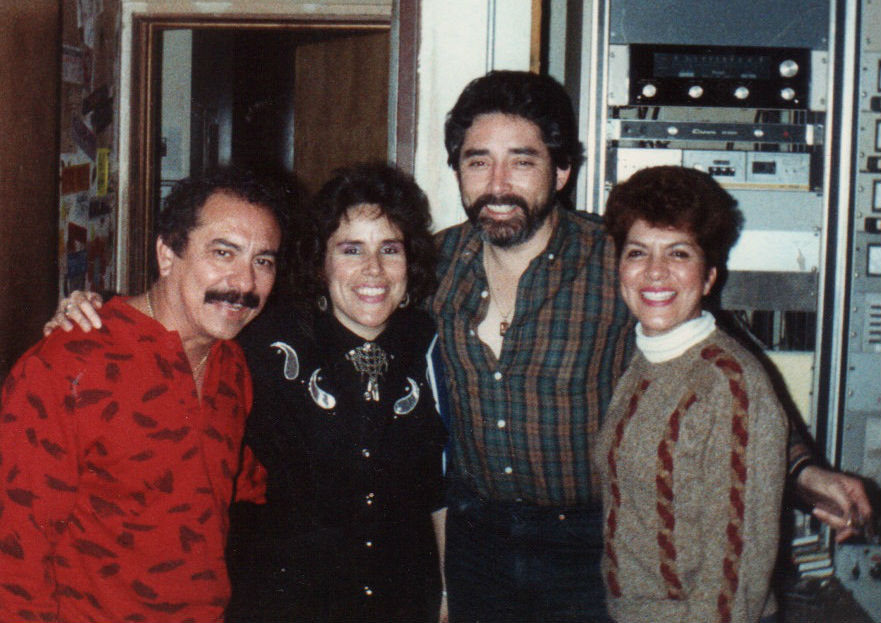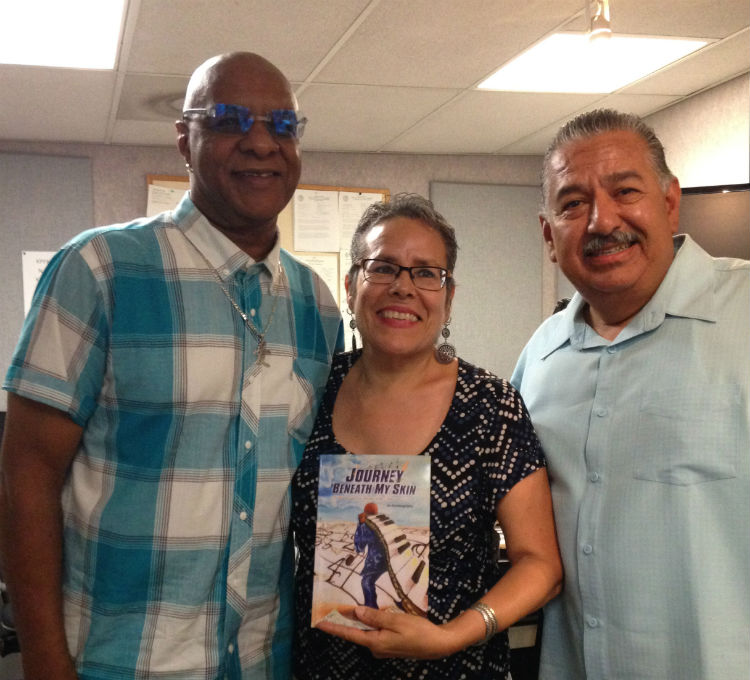
The unbeatable foursome that made “Canto Tropical” sound like a party every Saturday night back in the day: Gustavo Aragon, Kathy Díaz, Hector Reséndez and Pia Franco.
In April 1986, a new show took to the airwaves on KPFK, 90.7 FM. Titled “Canto Tropical,” its mission was to play the best darn salsa and Afro-Cuban music in all of Southern California.
The genius behind the show was Hector Reséndez, better known to listeners as “La Voz.” He was coming off a long run on another salsa show on public radio—KXLU’s “Alma del Barrio.”
He had heard that KPFK was looking for someone for a salsa program and was practically given the show on the spot after submitting a tape (yes, a cassette tape). Originally, it aired on Friday mornings before moving to its permanent spot on Saturday nights where it has been ever since.
Hector was widely known in the salsa community not only because of his work on the radio but because he spun records (yes, records, remember this is 1986) at some of the most popular salsa clubs in the Los Angeles area.
In fact, that is how I met Hector. I used to frequent what was probably the best salsa club in all of Los Angeles’ history—Virginias—where he was the DJ. I was such a regular at the club that he gave me the nickname of “La Rumbera.” One day, he invited me to visit his show and to take some music.
Little did I know that that would lead to an invitation to join his show as co-host. That began a wonderful journey that has continued for three decades.
Eventually a core group formed when Gustavo Aragon and Pia Franco joined the team to complete an unbeatable foursome. Over the course of the years, there were several other broadcasters who joined the show too. Listeners often commented that listening to the show was like listening to a party. Hector retired from the show four years ago, leaving the show in my hands. Today, my co-host is Armando Nila “El Caballero Salsero.”
Despite the comings and goings of the voices behind the show, the goal has always been to support the music and the artists who create it.
In Los Angeles, it is public radio—not commercial radio—that has supported salsa/Afro-Cuban music. The principal shows, along with “Canto Tropical,” are “Alma del Barrio” and KJAZZ’s “Jazz on the Latin Side.”
Albert Torres, producer of salsa congresses all over the world, including the L.A. Salsa Fest from which “Canto Tropical” has been doing a live broadcast for four years, noted, “The most amazing thing is that the DJ’s do it totally free. The DJ’s of ‘Canto Tropical’ don’t know a life on Saturday night; this is their life. It’s spreading this beautiful music.”
Unlike other shows, “Canto Tropical” is heard in five countries throughout Southern California, from Santa Barbara to San Diego, because KPFK has one of the strongest signals in all of Southern California with some 113,000 watts of broadcast power.
That’s why we feel we make a difference in supporting local artists and artists from around the world because we give them a forum to have their music listened to and appreciated.

Albert Torres, salsa congress producer, joins Kathy Díaz and Armando Nila at the “Canto Tropical” 30th anniversary show.
The roster of artists who have been on our show reads like a who’s who in salsa. This includes such L.A.–based artists and groups as La Palabra, Johnny Polanco, Lucky 7 Mambo, Johnny Martinez, Hector Rivera, Chino Espinoza, Manny Silvera, Bobby Matos, Yamila, Adonis Puentes, Fay Roberts, Susie Hanson, Dayren Santamaria, Oscar Hernandez, etc., etc.
We have also welcomed Ray Ramos, Richie Ray, Bobby Cruz, Ray de La Paz, Tito Puente, Andy Montañez, Oscar D’Leon, Henry Fiol, Eliades Ochoa, Chucho Valdez, Maraca, Isaac Delgado, Louie Ramirez, India, Fruko and many others. Really, the list could go on forever.
As Susie Hanson, flautist and band leader, remarked on our special 30th anniversary show, “It’s home for our community. Everybody comes in to tell you about all their projects, their new CD, the new members of their band and where they are playing. It’s where everybody checks in.”
Josiel Pérez, Cuban trumpeter, added, “We are all part of a team. An artist can write a lot of music, he or she can record a lot of music. But if there aren’t radio hosts like you who play our music, it’s impossible for people to know our music.”
With any luck, “Canto Tropical” will be on for many more years. You can listen streaming live every Saturday from 8–10 p.m. at www.kpfk.org. Or check out past shows on KPFK’s radio archives.
As I always say, “Acúerdense que la rumba también es cultura.”

Leave A Reply